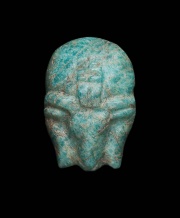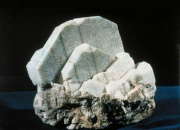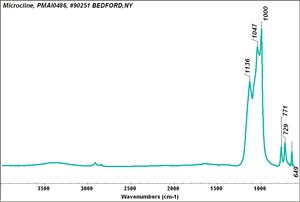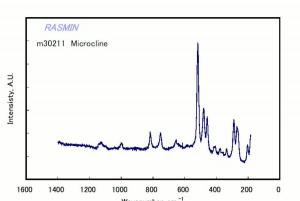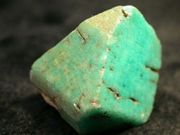Difference between revisions of "Microcline"
Jump to navigation
Jump to search
| Line 1: | Line 1: | ||
[[File:20.268-SC39857.jpg|thumb|Microcline pendant<br>MFA Acc. #: 20.268]] | [[File:20.268-SC39857.jpg|thumb|Microcline pendant<br>MFA Acc. #: 20.268]] | ||
== Description == | == Description == | ||
| − | + | [[File:Feldsparemr1.jpg|thumb|Microcline (potassium feldspar)]] | |
A variety of potash | A variety of potash | ||
[[feldspar|feldspar]] that is chemically identical to | [[feldspar|feldspar]] that is chemically identical to | ||
| Line 7: | Line 7: | ||
[[amazonite|amazonite]], is a green microcline that has been used since antiquity for decorative items. Microcline is used in making glass, porcelain, and enamel. Major deposits are found in Italy (Baveno), Norway (Kragerø), Madagascar, Russia (the Urals), and the U.S. (Colorado). | [[amazonite|amazonite]], is a green microcline that has been used since antiquity for decorative items. Microcline is used in making glass, porcelain, and enamel. Major deposits are found in Italy (Baveno), Norway (Kragerø), Madagascar, Russia (the Urals), and the U.S. (Colorado). | ||
| − | |||
== Synonyms and Related Terms == | == Synonyms and Related Terms == | ||
amazonite; feldspar; microclina (Esp., Port.); microklien (Ned.) | amazonite; feldspar; microclina (Esp., Port.); microklien (Ned.) | ||
| − | |||
[[[SliderGallery rightalign|Microcline, PMA.TIF~FTIR (PMA)|microclineRS.jpg~Raman]]] | [[[SliderGallery rightalign|Microcline, PMA.TIF~FTIR (PMA)|microclineRS.jpg~Raman]]] | ||
== Physical and Chemical Properties == | == Physical and Chemical Properties == | ||
| − | Color= colorless Crystal system = triclinic, may exhibit albite twinning Cleavage is perfect in one direction and good in another | + | * Color= colorless |
| + | * Crystal system = triclinic, may exhibit albite twinning | ||
| + | * Cleavage is perfect in one direction and good in another | ||
{| class="wikitable" | {| class="wikitable" | ||
Revision as of 14:19, 1 October 2022
Description
A variety of potash Feldspar that is chemically identical to Orthoclase. However microcline has a triclinic crystalline system while orthoclase has a monoclinic crystalline system. Under a polarizing microscope, microcline displays a minute multiple twinning that forms a grating-like pattern. Amazon stone, or Amazonite, is a green microcline that has been used since antiquity for decorative items. Microcline is used in making glass, porcelain, and enamel. Major deposits are found in Italy (Baveno), Norway (Kragerø), Madagascar, Russia (the Urals), and the U.S. (Colorado).
Synonyms and Related Terms
amazonite; feldspar; microclina (Esp., Port.); microklien (Ned.)
Physical and Chemical Properties
- Color= colorless
- Crystal system = triclinic, may exhibit albite twinning
- Cleavage is perfect in one direction and good in another
| Composition | K2O-Al2O3-6SiO2 |
|---|
Resources and Citations
- G.S.Brady, Materials Handbook, McGraw-Hill Book Co., New York, 1971 Comment: p. 316
- Jack Odgen, Jewellery of the Ancient World, Rizzoli International Publications Inc., New York City, 1982
- Encyclopedia Britannica, http://www.britannica.com Comment: "microcline" [Accessed March 4, 2002]
- Ancient Egyptian Materials and Technologies, Paul Nicholson, Ian Shaw (eds.), Cambridge University Press, Cambridge, 2000 Comment: B.Aston, J.Harrell, I.Shaw, "Stone" p. 21-22.
- Wikipedia: http://en.wikipedia.org/wiki/Microcline (Accessed Sept. 10, 2005)
- Van Nostrand's Scientific Encyclopedia, Douglas M. Considine (ed.), Van Nostrand Reinhold, New York, 1976
